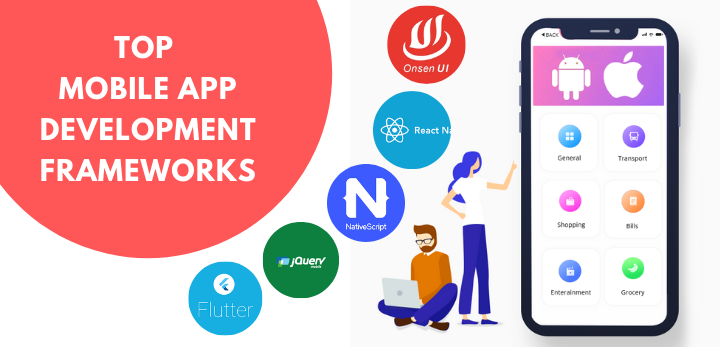Choosing a framework is an important part of any mobile app development project, as this will guide the security, performance, and cost-effectiveness of your app. With so many frameworks available today for your team, the choices can be overwhelming, as it’s important to also factor in your budget and scalability, among several other aspects. So, what is the best framework to develop mobile apps in 2023? Our mobile app development agency has some tried-and-tested recommendations. Here’s our round of the top 15 best frameworks for mobile app development this year.
1. React Native
This framework provides cross-platform app design in an extremely easy-to-build fashion, hence why it is one the most popular frameworks every mobile app development agency uses.
Why is React Native a good idea exactly? Well, it:
- Provides highly efficient cross-platform development due to code reusability across platforms
- Highs build apps with high speeds
- Super-friendly UI
Fashioned to execute more like a JavaScript library in reality, React Native is a solid option to go with even in 2023.
2. Swiftic
If you’re building for the iOS market, then Swiftic is one of the best iOS frameworks to place your faith in.
Here’s what’s so great about this framework:
- Several customizable themes with a huge diversity
- Smooth learning curve thanks to its simple-to-follow UI
- No restrictions on push notifications, plus you also get comprehensive analytics compared to other frameworks
3. Corona SDK
Yet another cross-platform development environment with outstanding features, this is the framework you should use to build apps that will perform hitch-free across mobile devices, smart TVs, and the web.
It becomes especially ideal for animation and graphics due to the boost provided by its OpenGL hardware hastening feature.
Some advantages of using this framework include:
- Corona SDK has a small memory footprint due to it being a lightweight scripting language
- It provides live testing and real-time simulation as well
- Developers can call any native library using this framework
The icing on the cake: it offers high-speed development and is open-source and free.
4. Xamarin
Our mobile app development agency has a particular liking toward the cross-platform development framework Xamarin. That’s because not only is it easy to work with but it also provides the following benefits that can help grow any business:
- It leverages C#, which is easy to use while remaining functional. Not to mention it uses just a single technological stack so there’s no need to learn multiple languages
- Xamarin offers huge compatibility with wearables, IoT, and even TVs, and can provide a superb near-native experience for these apps
5. Flutter
Google’s Flutter framework offers as close to native app performance as cross-platform environments will get. In fact, Flutter has enjoyed tremendous success, helping to build one of Asia’s largest marketplaces, namely Alibaba.
What are the advantages of using Flutter? Some pros encompass:
- Widget modification becomes simple with Flutter
- Wide support from a large community
- Rich documentation and reduced testing time
- It uses the Dart language, which is easy to learn
These reasons make Flutter a fan-favorite among developers and businesses.
6. Ionic
Based upon the robust foundations of Angular and Apache Cordova, Ionic has become iconic among the mobile app development frameworks 2023 has to offer. Code can be written in CSS, JavaScript, and HTML
A couple of standout features of this framework include:
- An exhaustive range of features that incorporate several UI elements
- It offers a functional and clean design which improves development and time-to-market
7. Apache Cordova
Apache Cordova is a solid development framework in its own right that leverages the three languages that Ionic does as well. In some circles, you may also come across this framework being referred to as PhoneGap.
Here’s what it can do for you:
- Excellent code reusability so you don’t have to start from scratch across different platforms
- Security is watertight while the UI is built for friendliness and aesthetic appeal
- Low-cost, cross-platform app design
8. Mobile Angular UI
If you have some experience with Angular JS and Twitter Bootstrap, then you should feel right at home with Mobile Angular UI. It’s an excellent option that helps businesses build present-age web and mobile apps.
The upsides of Mobile Angular UI encompass:
- Awesome range of mobile components from switches to navbar, and many more
- It’s open-source and free to use
- Excellent code reusability as well
9. Titanium SDK
While it may not be one of the most popular frameworks for mobile app development, our mobile app development can vouch for its excellence. From just one JavaScript code base, you can build app iterations across Android and iOS.
The benefits of Titanium are:
- Smaller code base to execute app features compared to other frameworks
- It gets around the need to master the iOS API and Objective-C, thanks to the framework’s JavaScript, driven cross-platform development
10. Onsen UI
When trying to bring complex mobile app ideas to life, the Onsen UI framework can help set any mobile app development agency on its way much faster compared to conventional solutions.
Stand outfit features of Onsen UI include:
- Same source code support for Android and iOS
- It offers hybrid and web app development that feels native
No need to use a JavaScript framework (although you can if you want to), due to its range of ready UI elements.
11. Framework 7
You may have not heard of this and are wondering who uses Framewor7? You’d be surprised to know that brands like Otelika have it at the cornerstone of their tech stacks.
Our mobile app development agency, from experience, has a particular appreciation for the following features of this framework
- In-built helper libraries that fast-track development
- Smooth learning curve
- Countless options for pre-styled widgets
12. jQuery Mobile
The syntax for this framework doesn’t fall far from the Framework7 tree. While it has fallen down the pecking order for many agencies, we cannot overlook this JavaScript framework’s reputation for building highly responsive mobile and web apps.
Pros of building mobile apps with jQuery:
- Custom theme creation without any coding, due to the ThemeRoller feature
- It offers cross-browser and cross-platform compatibility
- jQuery enables rapid and cost-effective app development as well
13. NativeScript
Why use NativeScript? Well, if you don’t want to build a native app for each platform, such as iOS and Android, yet still want to provide a near-native experience for users of either divide, then using NativeScript is prudent.
Here are some highlights of using this framework for mobile app development:
- Developers have unrestricted access to APIs for both iOS and Android
- You don’t need to use Web views to build native UIs with this interface
- The backend support is robust
14. Sencha Ext JS
Another JavaScript framework popularly turned to for mobile app development over the past couple of years, Sencha Ext JS is perfect for developing web and mobile applications.
Here are a couple of reasons our mobile app development agency recommends this framework:
- Sencha offers excellent support
- So far, we haven’t encountered any compatibility problems
- So many components to work with (for both desktop and mobile apps)
Despite being a fairly old framework, it’s still quite commonplace even in 2023.
15. Codename One
If you are versed in Kotlin or Java, then you’re good to go with Codename One which accommodates both languages. One of the standout features of this framework is that you can create native OS binaries to upload to the requisite platform.
A few more upsides of this framework entail:
- Write once, run anywhere, with just a single Kotlin/Java codebase
- Drag-and-drop Graphical User Interface that makes development fast and simple
- Large range of skins across multiple devices to ensure super app appeal across the board
Parting Shot
These are the top mobile app development frameworks in 2023. However, the one that best suits your project will depend on a lot of exceptional factors, unique to your project’s- and business’s- goal. Like the different elements in a carpenter’s toolbox, each tool is suitable for a particular job. It’s therefore advisable to go with the guidance of a proven mobile app development agency for good measure.








